Acting High Court judge Justice Stanley John, on Thursday, disallowed a question put to former Supervisor of Election Sylvia Findlay-Scrubb about whether the ballots used in 2015 were in keeping with the law.
The judge did not allow lead counsel for the election petitions, Queen’s Counsel Stanley “Stalky” John to ask the question following objection by lawyers for the government, Senior Counsel Douglas Mendes and Antony Astaphan.
Findlay-Scrubb was, at the time, being cross examined as the first witness for the government in the petitions that Benjamin “Ben” Exeter of the New Democratic Party has filed, challenging the announced result in Central Leeward in the December 2015 general elections.
Findlay-Scrubb, at the beginning of her testimony, had told the court that she was familiar with the election law, the Attorney General’s Chambers having briefed her after she took up the role.
Throughout the cross-examination, she repeatedly referred to the election law and spoke of actions that she had to take if she were to be in compliance.
During the cross examination, counsel John noted that rule 15 of the election regulations makes provisions for the ballots that should be provided in an election.
He said the law speaks to the provision of a space for the names of candidates, adding that he takes Findlay-Scrubb word for it that the ballots were capable of being folded, as the law demands, and had a space for the initials of a presiding officer on a counterfoil.
“Both of which are there,” Findlay-Scrubb said.
John then asked her where does the counterfoil begin and end.
“Where it says ‘tear here’, there is a perforated line that goes right across there, so as long as you separate there, the upper portion is the counterfoil,” Findlay-Scrubb said, using a photocopy of a ballot contained in her witness statement, which, like all other witnesses, was tendered as her evidence in chief.
Counsel John told Findlay-Scrubb that in the photocopy of the ballot, there is a box marked “space for initials of presiding officer” and asked her if that was on the counterfoil.
Yes, she replied.
He then had Findlay-Scrubb read the election rule that says the ballot
is to have attached a counterfoil and a stub and a line or perforation between
the ballot and the counterfoil and between the counterfoil and the stub.
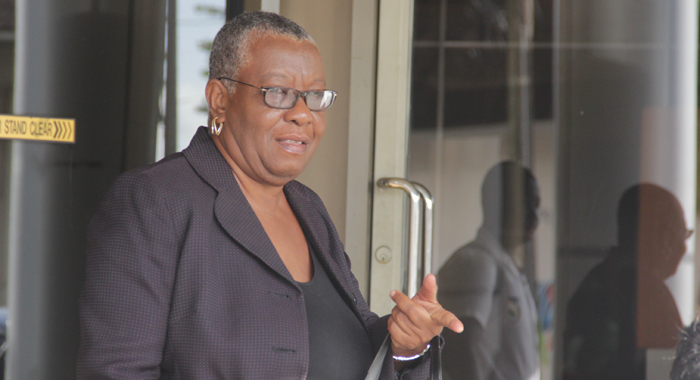
Findlay-Scrubb told the court that based on what the law says, there is a counterfoil attached to the ballot, and a stub is also attached to the ballot.
The stub remains in the book, when the voter votes, the document is further broken down into two pieces.
The lawyer then asked the witness if when the document is further broken down, if the box for the presiding officer’s initials should be on the counterfoil or on the ballot.
Mendes then rose and told the court that there is no allegation in the petition that the ballot is not in keeping with rule 15.
Senior Counsel Anthony Astaphan, a lawyer for the government, also rose and told the court that nothing that counsel John had crossed examined Findlay-Scrubb about up to that point was pleaded, including the ballot boxes not having keys or the ballots, stubs and counterfoils.
He said that cross examination should be confined to the pleadings, adding that there are two pleadings in relations to the ballots, namely in relation to official stamps and in relation to two ballot boxes, the initial and stamps were not found in the ballot boxes.
He said that the only pleaded matters in relation to the Supervisor of Elections was that the petitioner got the voter’s list late.
But John called the attention of the court to paragraph 23 of the petition in which Exeter alleges “the said ballot appeared to have been wilfully mutilated in a matter contrary to rule 15(2)”.
John said he was asking the witness questions in relation to rule 15(2).
However, Mendes said that not because 15(2) means counsel John could “go on a wild horse race of his own”.
Mendes said that the sentence began “the said ballot”, adding that that refers to the ballots in polling stations CLF and CLF 1.
He said there is no pleading that in the design of the ballot, which would apply to all of the boxes, not just CLF and CLF 1, that the ballots were not designed in relation to rule 15.
For his part, Astaphan said that paragraph 24 refers to “similar looking ballots in ballot boxes from various polling stations which were ruled invalid by the 1st respondent.
He said that the petition further alleges at paragraph 26 that there was a breach of the secrecy of the ballot because of the location of the stamp and initials of the ballot.
The judge said he is mindful that election petitions are very serious matters and when a complainant makes allegations, he ought to be ventilated.
He, however, said that, on the other hand, their complaints are based on their pleadings, adding that it is clear to him that what is being alleged in the pleadings is restricted to the ballots cast in CLF 1.
Justice John said that while he was prepared to give counsel John some level of latitude in his cross examination, he was sure that with the counsel’s wealth of experience, he would be mindful of what was brought by the petition.
Counsel John then asked for the judge’s assistance in understanding why he has concluded that what is pleaded is restricted to CLF and CLF 1.
The judge said that unless he read it incorrectly, the case was about central leeward, and from paragraphs 20 to 22 of the petitions speak to a ballot in particular polling stations.
He said that counsel John’s cross examination of the witness so far, as
he understood it, was that he was trying to establish that the ballot as
exhibited is not in compliance with rule 15.
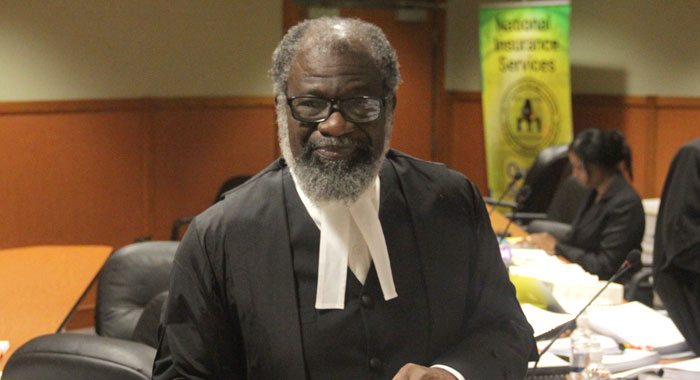
Counsel John said the judge was correct in that conclusion and the judge said that if that is where he is going, he thought the lawyer was going to deal with the ballots as far as CLF is concerned.
Counsel John then told the court that rule 15 relates to all the ballots.
“So if I am dealing with rule 15, the way I am thinking, m’lud, I am dealing whether they are compliant in CLF, CLB, CLI, with ballots and the provision for all ballots.”
The judge told the lawyer once he appreciated that he (the lawyer) was not saying that all the ballots in the 2015 ballots were mutilated in one form or another.
“That is not your complaint,” Justice John said.
The lawyer told the court that Justice Esco Henry, in her judgment of Nov. 13, 2018 had indicated that regarding the matter of mutilated ballots, “It does not appear that this subparagraph restricts its applicability to any specific polling station. To the extent that it charges that mutilated ballots were included in the counts at polling stationswithout distinguishing which stations…”
Justice John noted that this referred to the Central Leeward constituency and counsel John noted that that is the one he is dealing with.
The judge told the lawyer that the court is asking him to be mindful that it is not Exeter’s case that the ballot papers in all the constituencies were defective.
“No, no, m’lud, this election petition is only about Central Leeward,” counsel John said, adding, “And whichever polling station in Central Leeward ballots were used, they ought to have been consistent with rule 15.
He said he could understand Mendes “becoming animated but I do it sometimes too. I never like to see my witness in a situation. Sometimes, I give them a little help.”
But Mendes rose and said there was no intention to give the witness any help at all,” triggering some laughter by counsel John.
Mendes said that Findlay Scrubb was handling herself quite competently.
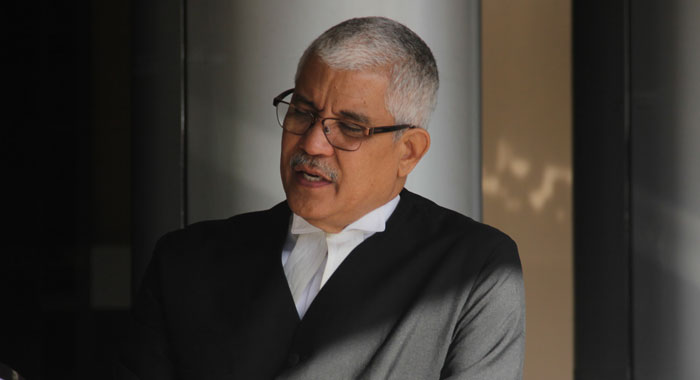
“My intention was to point out what my friend’s pleaded case is. There is not a sentence in his petition that says that the ballots in Central Leeward, … are in any way in violation of the rules because the box or the presiding officer’s signature is located on the counterfoil.”
When counsel John resumed his cross examination of Findlay-Scrubb, the former election chief told the court that the stub and the counterfoil are not the same neither are the ballot and the stub the same thing.
She further told the court that the ballot and the counterfoil are different.
Asked if the box marked “space for initials of PO” is on the counterfoil, if it is on the ballot, Findlay-Scrubb said it is not.
She, however, said that Form 7 does not make that distinction.
Findlay-Scrubb was asked to look at a photograph of a ballot used in the March 2001 general election.
She told the court that that ballot doesn’t have a counterfoil but has space for initials of the presiding officer.
She said that this is consistent with 15(2)(c).
Findlay-Scrubb was also shown a photocopy of a ballot used in the 1994
election.
She said that that ballot was also consistent with all of Rule 15(2).
Counsel John then asked her if they are not both different from the 2015 ballot used in Central Leeward because of where the space for the presiding officer is merged with the counterfoil.
The lawyer then asked Findlay-Scrubb if she agrees that if the 2001 ballot is in compliance with the rules, the 2015 ballot is not.
Mendes then rose and told the court that apart from the fact that the question regarding whether the ballot is or is not in compliance with the law is a matter for the court, the question relates to a matter that is not a pleaded.
The judge told counsel John that issues of law are for the court to determine.
But counsel John told the court Findlay-Scrubb has interpreted the section of the law and as the supervisor of elections can have an opinion.
The judge then said he would determine if it is in compliance with the law.
Counsel John then asked the court if he could ask the witness if the ballot was in compliance with rule 15(2).
Mendes rose and said he had to do so to defend the dignity of the court. He said that Justice John had made a ruling and counsel John must abide by it.
Counsel John said he was abiding by the ruling but was seeking clarification on a question he may ask, adding that he has been consistently been doing do.
He further told the court that whether in cross examination of re-examination, “it seems that any question one ask that creates a difficulty for the witness or the other side is subject to objection”.
John said he appreciated that Mendes is very astute and therefore, he is seeking the court’s guidance on “the clumsy manner in which I ask the question that I can ask and opportunity to do that”.
The judge, however, repeated that it is not for any witness to determine if any matter is in compliance with the law or not.
“That is the function of the court,” the judge said, adding that no question should be put to the witness that would invite her to give her opinion on the law.
Counsel John then asked the court if he could ask Findlay Scrubb whether something that was done was done in accordance with how the rule says it ought to be done.
He said that at the end of the day, the court would rule as to whether anything is consistent with the law.
He further said that Findlay-Scrubb has the responsibility of supervisor of elections, and the responsibility to execute duties consistent with rules, regulations and laws.
“And it seems to me that one can ask her, not to determine whether something is legal or not legal or not legal in the sense of a decision that the court would make, but her opinion.”
The judge reminded counsel John that in his cross examination he had asked Findlay Scrubb if in the performance of her duties she had adhered to the law and she said yes.
Counsel John said he was not asking Findlay-Scrubb in a general way, but was showing her a document that was consistent with the rule that she was supposed to abide by and not whether it was valid or not.
The judge said he would allow Findlay-Scrubb to answer the question.
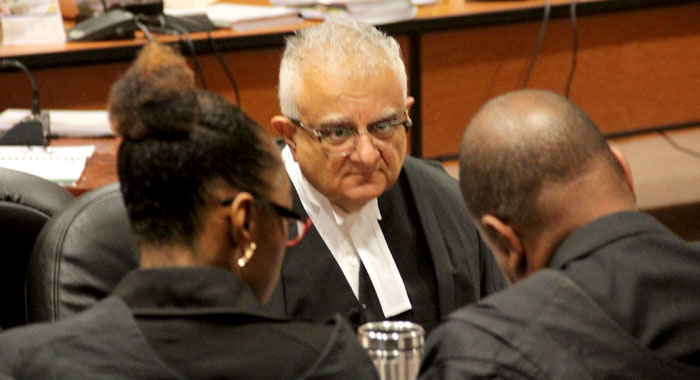
Counsel John then told Findlay Scrubb that she had said the 2015 ballot was in accordance with the rule but is designed different to the previous ballots and he was asking her, if the ballot with the different design was also in compliance with the rule.
“No! She cannot answer that,” the judge said.
As the cross examination continued, counsel John pointed out that in her witness statement, Findlay-Scrubb said she was responsible for having the ballots printed.
She said she saw the templates sent to the Government printers and visited the printer at Campden Park to examine the ballot papers that were being printed because of certain problems that had arisen in the printing of the ballot papers.
Findlay-Scrubb told the court that the problem was that the printers needed her guidance because initially they were catering for a size that had three candidates and in two constituencies they had four candidates so they had to make some adjustments.
The cross examination of Findlay-Scrubb continues today, Friday.
The NDP’s Lauron Baptiste is also challenging the announced victory of the Montgomery Daniel in North Windward.
His lead counsel, Keith Scotland, is expected to cross examine Findlay-Scrubb separately in relation to that petition.
The Unity Labour Party was declared winner of the election, having won eight of the 15 parliamentary seats for a fourth consecutive term in office.




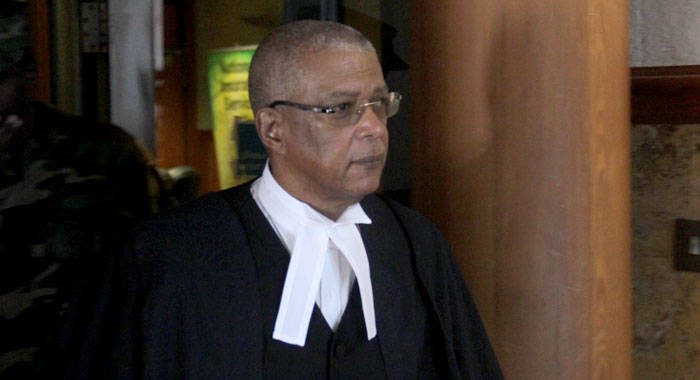


Kenton the presiding judge Justice Stanley John , is he the same person who is the chief counsel Stark John? I am a bit confused here.
Yes, he is the same person. Any fool would know that.
Please put down the crack pipe my friend
Both men have the same name.
Me know that from day one when this was reported on this site and elsewhere. Just had to make some fun at this person’s expense for asking such a moronic question. Still, not any any more moronic for claiming, “In nomine Patris et Filii et Spiritus Sancti.”
Same name; two different persons.
One the Judge; the other the leading Counsel for NDP.
It is clear to me that the judge will not allow evidence that proves that the ballots were not in compliance with the law. In any other democratic country the trial would immediately be over and either Ben Exeter would be declared the real winner of that seat or there would be a new election.
I cannot believe it!
Is this democracy in SVG?…Talk about bias. We have another Cottle here. It does not take a rocket scientist to see how this trial is going to turn out. Clear evidence of election fraud is not allowed in court? If that is the goal, then why is there a trial in the first place? Why do we even have elections, when the ULP is the only party ever allowed to win regardless of all the mischief they do?
It seems to me that you don’t understand — or want to understand — the law which is that is the job of the Court in cases like this is to determine the legality of what took place at the polls while the job of withnesses is to present the facts of what took place to the best of their ability.
Why can’t you accept that the executive branch of government makes laws; the legal system interprets and administers laws; and witnesses in legal cases like this supply evidence based on their first-hand experience which the judge then uses so determine whether any laws were broken. In a case like this, my personal view is that the judge would also have to ask himself that even if laws were broken were these breaches sufficient to negate the results of the vote.
It seems that NDP acolytes like you, having seem the handwriting on the wall, are already crying “the Judge thief the trial” in the same you you cried that Ralph and hapless Winston Gaymes thief the election.
Cry babies and sore losers, all of you.
No idea who wrote this but in total agreement.
When the NDP gets judgment in their favor, justice is alive and well. When they don’t….
“He further told the court that whether in cross examination of re-examination, “it seems that any question one ask that creates a difficulty for the witness of the other side is subject to objection”.
This sentence from the trial really tells it all!
This shows that there is NO Democracy in the SVG “just-us system” when it comes to the Vote. In my opinion anyone else who has thier brain in the “on” position can see what the predetermined outcome of the trial is going to be regardless of the evidence presented.
Kenton, thank you for exposing this for all to read!
This is simply shocking!
That sentence from the trial tells nothing but the fact that the defence has a perfectly legal right and duty to his clients to raise objections as he sees fit.
It is simply “shocking” how biased you are against both the ULP and our entire system of British jurisprudence, the best system in the world.